#and it's been like that ever since
Text
George Karizaki and the Tragic Clown Paradox
(aka) The George Karizaki Dilemma — My George Character Analysis
WARNING: This essay goes into dark topics such as child abuse, trauma, and many other touchy and sensitive topics. Read at your own risk, basically. Also contains spoilers up to episode 48 of Revice.
Warning, again—sensitive topics ahead.
big thanks to @alpona for inspiring me to actually write and post this.
My Interpretation of the Inner Demon Reveal
Vulnerability is defined in the Oxford Dictionary as: “the quality or state of being exposed to the possibility of being attacked or harmed, either physically or emotionally.” George Karizaki is a character that uses humor to disguise vulnerability. On the surface he comes off as more of an unbothered-genius, or mad scientist archetype. He works on what he likes, moral or not, all with an infuriating cocky-smile on his face. But humor isn’t the only thing George uses to hide his vulnerabilities, the very mask of ‘mad scientist,’ or a ‘villain’ caricature/persona is one of the other substantial ways George disguises his own traumas, fears, and pains. At the heart of it all, George cannot be analyzed without being placed in the “Tragic Clown Paradox.” Or— the ‘sad clown paradox’ as wikipedia calls it.
Wikipedia defines said paradox as: “The contradictory association between comedy and mental disorders such as depression and anxiety.”
More specifically, the link between humor and trauma. The paradox here, of course, being the fact that clowns—who are associated with laughter, fun, etc.—are actually the saddest or perhaps loneliest individuals in the room.
This analysis seeks to examine George Karizaki as a character: how he’s being presented, his type of humor, and most importantly—how it all relates to his trauma.
First on the list of analysis then, is the clown archetype and why I think George fits particularly well into it, and what that might mean for the character. In the article “The Great Comedians: Personality & Other Factors,” Samuel S. Janus states:
“The world of theatre has always found meaningfully symbolic the alternate faces of comedy and tragedy. Historically, court jesters were tragicomic figures— the embodiment of the bittersweet of life. Among the oppressed, the role of social critic has been the comedian's forte. Freud indicated that humor is a release for anxiety, to quote Abe burrows: ‘The comedian must practice his comedy in order to avoid destroying himself.’ Jack Carter, another leading humanist, says: ‘the funny part, the laughter, is given to the audience, but the comedian is left with the bitter dregs.’ Comedy has been described by a leading theologian as: ‘The ability to laugh at one’s own tragedy.’”
This is a particularly powerful section looking at the role of the tragicomic—the jester, the clown; and just how entwined with tragedy said comic is. Now, examining George’s portrayal in the show, fifty-one seconds into the first episode of Revice we are introduced to George first via his voice-over explanation about the Giff stamp. Then he brings up the idea of fighting demons with demons and with a snap of his fingers he brings up Daiji’s profile. Here we see George as a confident scientist. He obviously has a plan and knows what he’s doing. All, as stated previously, with a cocky-smile on his face.
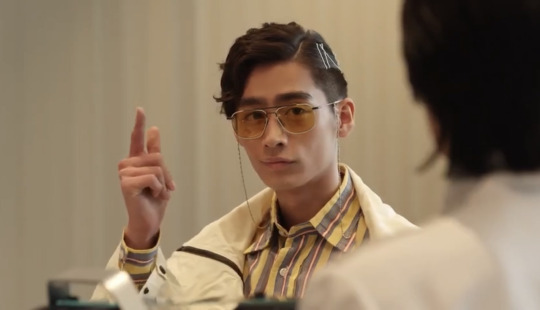
At Daiji’s coronation he cuts off Hiromi and pushes him humorously out of the way, saying he’s ‘taking too long.’ (This is notably also the first episode where we hear mention of his father and/or his father’s scientific legacy.) During the entire attack at the coronation, George is shown to be one of the only people not panicking. He’s rational and level-headed, even warning Hiromi not to try using the vistamp because it would be too strong for him. But then refusing to intervene or do anything more, letting Hiromi go through (and fail) at transforming. Simply stating: “See?” when things go wrong. This—from the standpoint of the audience, is also quite humorous.
George takes on this theatrical jester archetype throughout the entirety of the series, sarcastically commenting on the sidelines as things take place within the central plotline. Like with Hiromi’s failed henshin. In “Fools are Everywhere” Beatrice Otto takes notice that ‘It is the nature of jesters to speak their minds when the mood takes them, regardless of the consequences.” In fiction, and real life, jesters employ a variety of skills. Such as storytelling. In fact, the modern term derives from gestour, or jestour, Anglo-Norman (French) meaning ‘storyteller’ or ‘minstrel.’ (Wikipedia) Jesters have a privilege of mocking/stating the truth to those in power (King) and being able to get away with it. George Karizaki is shown (like in episode 1) to mock, narrate, or comment on a situational folly or irony—again, such as Hiromi’s failed transformation.
There are, of course, other notable instances of George’s jester antics—such as in episode 2, when Hiromi is informed he’s been demoted. Stating: “Your disgraceful failures to protect our Vistamp research labs AND inauguration ceremony have led you here.” So truthful and mean that you, as the audience, can’t help but feel bad and be amused. But instead of ending it there, George puts on that mocking smile of his and says in English, “Don’t mind, Hiromi.”

George, like most jesters, are passive commentators rather than active forces within the narrative. They spectate. In fact, the most active thing George does is create vistamps to be used, which is barely, if ever, shown on screen. Yet somehow George still manages to manipulate and dictate main storyline events. Often working as the catalyst for something to happen in the episode. Such as when he gives Daiji a henshin device, or when he sticks a tracker on something stolen from their base in episode 14/15.
Moving on to his sense of humor, George’s humor is a mix between self-enhancing humor that: “Involves a generally humorous outlook on life, a tendency to be frequently amused by the incongruities of life, and to maintain a humorous perspective even in the face of adversity,” (Like George at the coronation in episode 1), and Aggressive Humor which “relates to the use of sarcasm, teasing, ridicule, derision, ‘put down’ or disparagement humor.” Both are used to enhance the self, and the second is used to enhance the self at the expense of others, specifically.
In Scott Kaufman’s and Aaron Kozbelt’s study, “The Tears of a Clown: Understanding Comedy Writers” they look at these types of humors and found self-enhancing humor to be positively correlated with social support and optimism, suggesting an optimistic outlook on life is closely linked to using humor for coping, perspective taking, and emotional regulation. On the other hand, they found aggressive humor to be positively correlated with self-report measures of hostility and aggression. We have seen George employ both kinds of humor throughout the show. Especially aggressive humor. This shows that George, as a person, is someone who uses comedy to cope and emotionally regulate himself, aka: He builds himself up by taking others down. I stated at the beginning that George uses humor to hide vulnerability, and to give himself a sense of control. As George—though it might not be obvious at first glance—is someone who hates loss of control, as it puts him in a vulnerable position and reminds him of his past trauma, which I’ll get to in a minute.
Above is a video of George putting on his Villain persona in response to Hiromi lashing out at him
Janus states that, “there appears to be an awareness on the part of the audience of the relationship between humor and anxiety. Consequently it would be reasonable to assume some awareness of the fact that comedians are very anxious and often depressed people. (...) Humor, then, can be seen to be especially applicable in situations in which the individual feels himself to be powerless.”
Power, powerlessness, control, and lack of, are all important elements of George Karizaki’s character and the clown mask he uses to cope with his past and his present. In Janus' study on the relationship between humor and anxiety, he found that the early lives of all the subjects were marked by suffering, isolation, and feelings of deprivation; and I quote:
“Humor offered a relief from their sufferings and a defense against inescapable panic and anxiety. The presence of these same needs and ears almost universally accounts for the success of these particular individuals as humorists. The fact that humor is a language of protest to mitigate their anxiety and permits them to function. (...) It is felt that comedians are able to convert their rage from physical to verbal assault and that for many their comic routines are a form of acting out. (...) They (comedians) are keenly sensitive people who have an uncanny perception of the needs and fears of their audience.”
Losing his father at such a young age and with no information about a mother, other than the mention of her not being around/gone, I think it is safe to assume George grew up an orphan without parental role models in his life. But not having parents is not George’s only trauma.
(And here’s where my take becomes hot ….lol)
George was forcibly given his father’s inner-demon as a child. This is obviously a metaphor for the passing down of generational trauma. It is also a form of child abuse. If we examine the facts, which are: (1) the father inserted his demon into George’s body without his consent, (2) this hereby violates George’s sense of self/his bodily autonomy, (3) as stated above, it’s child abuse. You don’t use a kid as an experiment and violate his control over his own body and not have that qualify as child abuse. George had to have been about 4-5 years of age at the time. That’s messed up. Though he might not recognize it subconsciously, this is another reason George hates lacking control.

He’s already had things taken from him (i.e his parents) and things done to him (inner demon) all outside of his control. Then he had to grow up in that environment of deprivation and abandonment, where all he had left was his father’s inner demon and a legacy to live up to. This is also why Geeorge has the tendency to mask as a villain when confronted/put into an uncomfortable situation. It’s self-protection. “People lash out so that they can reject before they get rejected or abandoned. It is a way for the person to feel more in control, which makes them feel safer.” (‘Why do people lash out’ by Dr. Monocle Borschel) Some people with trauma lash out because they go into fight or flight mode when they feel threatened.
To George—being vulnerable is putting himself out to be exploited. So he masks behind aggressive humor and villainy instead.
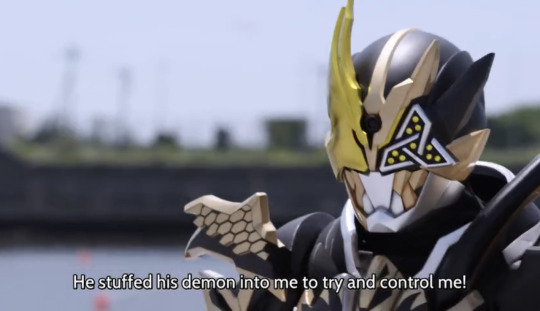
Now, onto George Karizaki’s dilemma.
One of the ways the George inner-demon reveal can be read (aka the way I read it) is as a metaphor for CSA. (Child Sexual Abuse.) How the scene is shown, the translation, and the fact that George’s bodily autonomy is being violated by his father, is why I came to this conclusion. This would also further explain George’s unusual sexual-coded interest in older men/father figures/authority figures. Victims can seek out the same type of abusers in order to have “control” over their own situation this time around, ergo “winning.” Though it never quite does work out that way. Either way, basically, if George is flirting/making the advances, then he has the control.
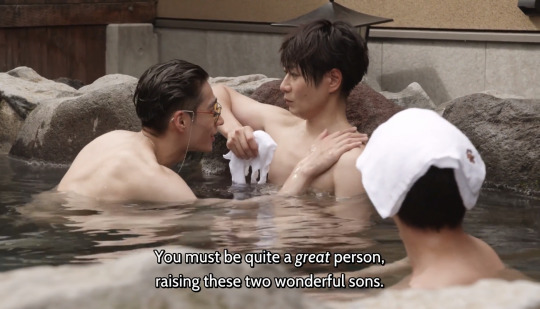
All throughout the show George is usually the one to initiate physical contact with others, not the other way around. And when it is the other way around? George has never once reacted positively, instead forcibly removing the hand/touch from his body.
Of course, this might’ve just been the actor being silly/doing something he finds amusing, for when he does things like flirting with the Igarashi father in episode 8 at the hot springs. But it still shouldn’t be ruled out imo.
One of my first questions at George's inner-demon reveal was: “How does this differentiate from the intergenerational trauma passed down to Ikki from his own father?” Ikki’s situation (mostly with Vail) is often seen as a physically and emotionally abusive relationship. Ikki literally uses himself as a shield to protect his other siblings from his father’s inner demon. Vice, Ikki’s own inner-demon, is modeled after Vail, his father’s demon. Vail caused Vice to be created. I could wax poetic on this forever. But in examination and comparison to George’s situation, I found that the difference was in the actions the fathers took. Genta failed to protect his family from his inner-demon and hurt them, both physically and emotionally. But, George? George’s sense of bodily autonomy is being violated. His father, in fear of losing his son, decides to do something to his body that can never be undone; and he does it in his sleep. All without George knowing or realizing what’s going on.
The entire situation reads to me as CSA.
That’s the difference in the traumas being passed down; because unfortunately, it is a common fact for victims of CSA to become perpetrators of it when they’re older. Once again it’s about revisiting the trauma but from the winner’s side. Which is a disgusting thought process/reasoning, but that is the underlying motive. Now, was his father abused that way? As the audience, we can’t be sure. We know from separate Revice releases that the father, Masumi, worked as a scientist in a position lacking power—but that’s all we really know about his side of the story. The only thing that hints at it being like that is the knowledge of this being an intergenerational trauma being passed down from father to son. Literally, the same inner demon. Plus, the fact that it is being passed down from body to body.
This is George’s essential dilemma—how he should view his father who was a good dad in most aspects up until the inner-demon insertion, and abandonment.
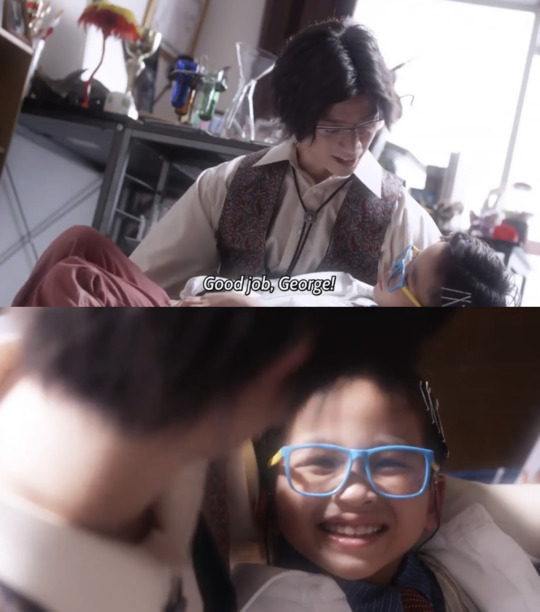
This is why George states that it would be easier to forgive his father if he were really dead.
The entire scenario does nothing but fill George with turmoil. How can he reconcile these two facts? The good and loving memories versus the abandonment and bodily autonomy violation. The bad things should make his father irredeemable, unforgivable, evil. But he was still George’s father. One who gave him a majority of good memories when he was around. The situation here isn’t black or white but a complex gray area.
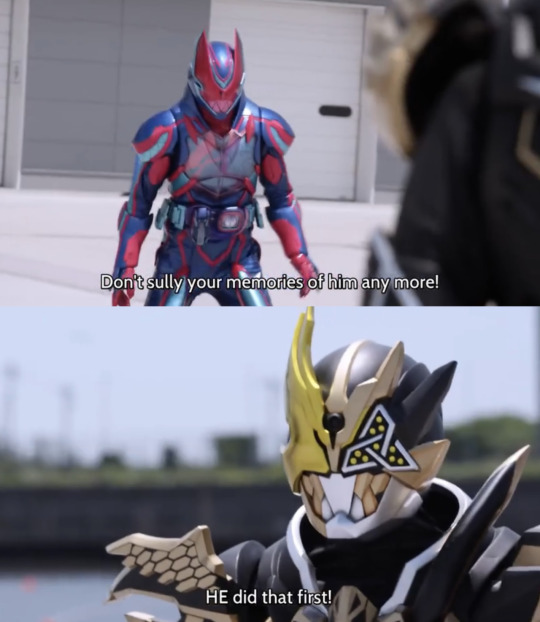
Even Chic, George’s inner demon, shows aspects of this: George and his father’s love for science (good)—but twisted into something ugly, and, humor—George’s way of coping. A perfect mix of the trauma and how it both drives George/causes him to react a certain way (masking, etc.). That’s what Chic represents. A trauma inherited from his father.
So, George Karizaki is a “tragic clown paradox” because of this gray situation he finds himself trapped within. It’s a lose-lose. The jester’s met his match. Humor finally wasn’t enough to mask his pain. So George did the next best thing: he became the villain. (Juuga)

A few things to note now that we’re coming to the end of my essay: (1) this situation reminds me of two other things—Perks of Being a Wallflower (Charlie), and Eliot’s situation in Mr. Robot. In BOTH cases (spoiler) the MC has been a victim of CSA by someone close and very dear to their heart. In Perks it’s by Charlie’s favorite person—his aunt, and in Mr. Robot it’s by Eliot’s father. Both Charlie and Eliot repressed these memories and went on remembering their abusers as people they really loved and who really loved them. Yet, once they remember what happened to them…sh*t hits the fans. Here’s a clip from Perks of the scene where Charlie remembers/finds out what happened:
WARNING: The videos below might be triggering, watch at your own caution.
youtube
Here’s a clip for when Eliot finds out:
youtube
In both, finding out had (obviously) detrimental effects on them. But even before that, their trauma is shown subconsciously. For Eliot, his personality split in order to protect himself. For Charlie, his depression and suicidal ideation. The same can be said for when George finds out. George literally slowly loses his mind, with the catalyst of his father dying adding to previous stress, and instead tries to destroy his father’s legacy by attacking his friends. All so that he can feel more in-control. All so he can feel he has power over his father. So yeah, Charlie and Eliot’s stories reminded me a lot of George’s, which only strengthened my previous assumption of his inner-demon metaphor being about CSA trauma.
Other things to note: (2) George uses touch to manipulate others, often initiating contact when trying to get someone to do something. Such as an arm over shoulder. For George, this can show that to him, touch equals power and control. Especially over others. (3) I think this is one of the reasons why George works out a lot. He worked out enough so that if someone touches him, he can physically remove the touch himself. No more letting others have control over his body without his consent.

#yeah this is triggering#yeah its totally my interpretation of the inner demon reveal#yeah the writers probably didn't mean for it to be interpretated this way#but I did so 🤷🤷🤷🤷🤷🤷#I hope this analysis at least explains my thought process somewhat#I know this is a hot take but its the way my brain saw the scene#and it's been like that ever since#(clown noises)#kamen rider revice#kronthescoup#ikki why is ur demon so cringe#revice analysis#george karizaki#george karizaki analysis#revice#kr revice#revice spoilers
11 notes
·
View notes
Text
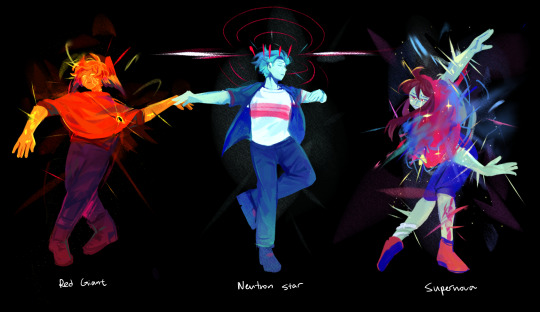
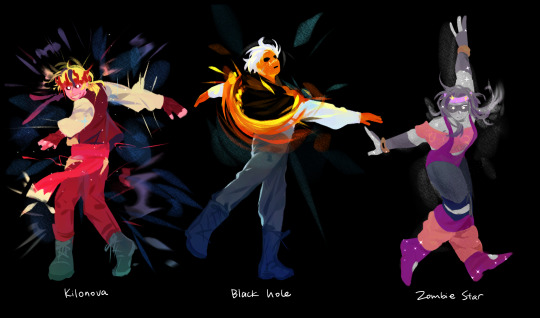
Stellar death
#dddaily4sherin#day 313 i totally did not mess up the day count yesterday#life series#grian#scott smajor#pearlescentmoon#inthelittlewood#goodtimeswithscar#zombiecleo#3rd life smp#last life smp#double life smp#limited life smp#real life smp#mcyt#trafficblr#traffic smp#my art#i had an epiphany after a certain astro class and have been losing it ever since#screw the solar system make them all (dying/dead) stars!!!!!! (and related events)#and I finally got to do it tdy LMASODAOS HOPE U GUYS LIKE THIS IM VERY HAPPY WITH IT >:D#also ppl who knows astronomy/astrophysics feel free to psychoanalyze the hell out of this. i had sm fun assigning them HEHEHE
10K notes
·
View notes
Text
if there's one design choice i dislike in rain world, it's moon's neurons
#my posts#gameblogging#liveblogging rain world#when i first read that according to the devs new players are 'expected' to eat them my heart broke#and it's been like that ever since#like yea the neuron glow might be helpful in shaded but it just feels so /mean/#and the number of posts i see on the subreddit about this is still so freaking high#and it seems very few people actually notice moon's reaction when you grab one#why couldn't they just put them out of reach#it's genuinely the only design choice that's baffling to me#uuuuuuuuuuuuuugh
1 note
·
View note
Text
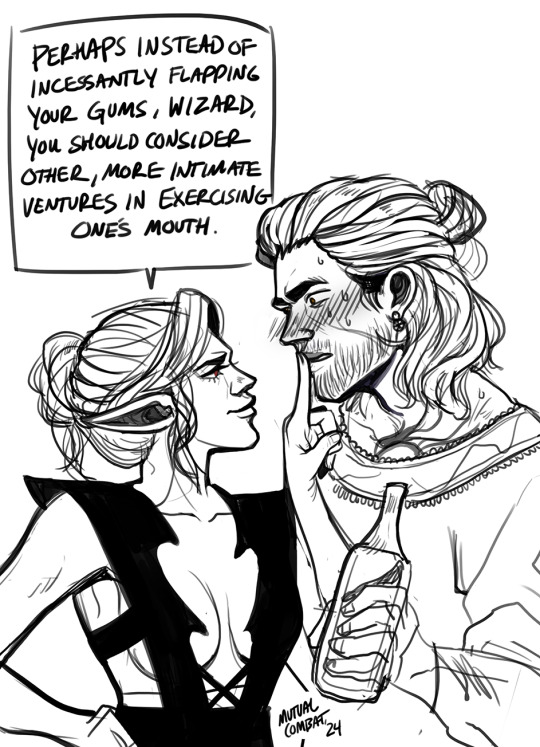
SPIDERWEAVE GANG RISE UP
#my boyfriend of all fucking people gave me this idea#he literally burst in the room while i was sleeping just to tell me emma gregory said minthara likes gale#hes stupid#also gale with the bun is canon sorry#bg3 romance#bg3 fanart#bg3#baldurs gate 3#baldurs gate fanart#baldur's gate 3#baldur's gate iii#gale dekarios#gale of waterdeep#minthara#minthara baenre#dj minty j and the gay#bg3 gale#bg3 minthara#bg3 shitpost#baldurs gate minthara#baldurs gate gale#my art#holy shit how many times can i tag something i honest to god dont know the limit and ive been using tumblr since 2009#spiderweave#gale x minthara#minthara x gale#this is probably the sweetest way minthara has ever told anyone to shut the fuck up#galethara
4K notes
·
View notes
Text

i miss them a little if im gonna be honest
#mp100#mob psycho 100#kageyama shigeo#kageyama ritsu#hanazawa teruki#tome kurata#tsubomi takane#shou suzuki#deliart#i meant for the image to be like. after the end but i also didnt think about the hairstyle changes. sorry......#also i know i was like shou 100% has dwarf hamsters since he got 2 but u know what i dont care. golden hamster stan for life#im planning on getting one i've been checking out breeders near me so i can get a proper healthy one. there are so many good ones here too#i already am thinking on what color im gonna go for..getting picky even. something like offwhite.. silver pearl.. silver dove.. silver mink#jurys still out on wether im gonna get another female or not#i do love how big ladies get and their intense energy and work ethic. truly the most passionate creatures i've ever come across. inspiring.#but a lazy fluffy guy that just sits around and washes his balls all day does seem easier. less likely to climb my curtains.#i got distracted i love hamsters so much. look at my mop drawing now everyone
3K notes
·
View notes
Text
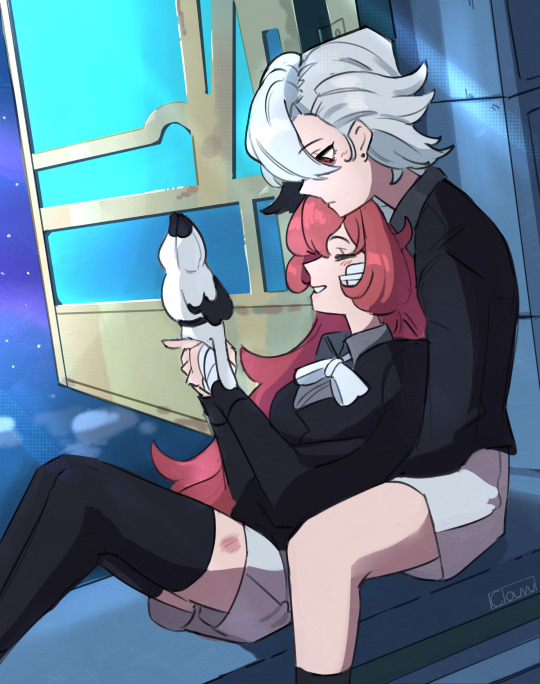
Nothing in the world belongs to me
But my love, mine, all mine
#genshin impact#arlecchino#peruere#clervie#ouhhhhhhhh im never gonna be able to emotionally recover from watching that animated short#ever since it came out a couple days ago just thinking of these two makes me feel like my heart is physically being ripped in half#i cant stop thinking about how Clervie was the only person in Arlecchino's life that she truly loved#like dont get me wrong Arlecchino loves her children in her own detached-fucked up way as much as any person with her amount of trauma can#but Clervie meant so much to her that even just her presence alone kept Arle's curse at bay#and it seems that no one other than Clervie herself has ever been able to break this unemotional/detached wall that Arle has put up#and maybe no one else ever will#DONT GET ME WRONG I still fw arle x other female harbingers like that shit is still peak#but oh my god the idea that arle never moved on after clervie's death and will never love anyone the way she loved her makes me want to SOB
2K notes
·
View notes
Text
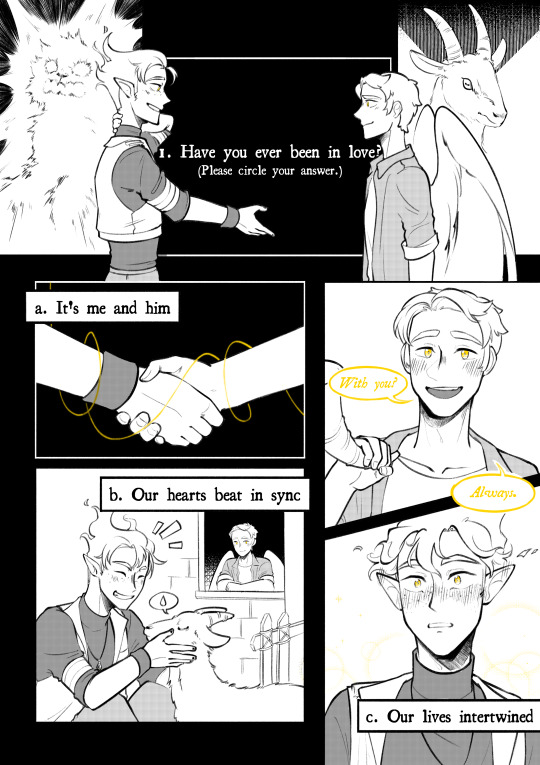
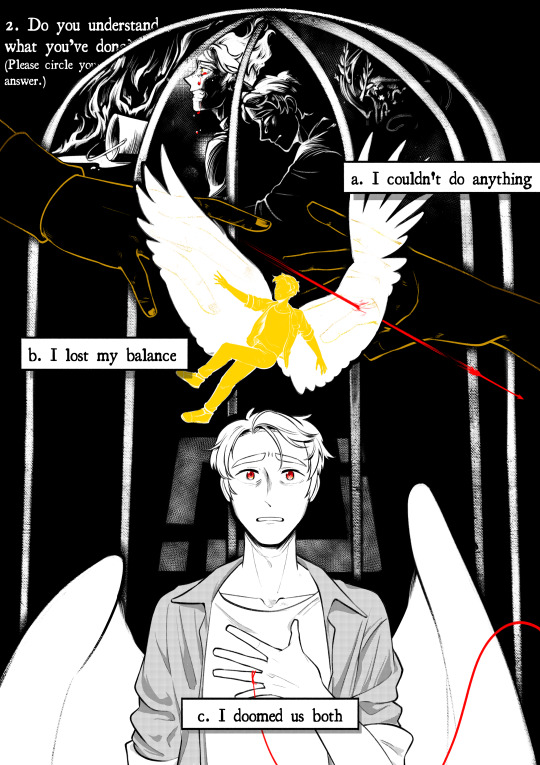

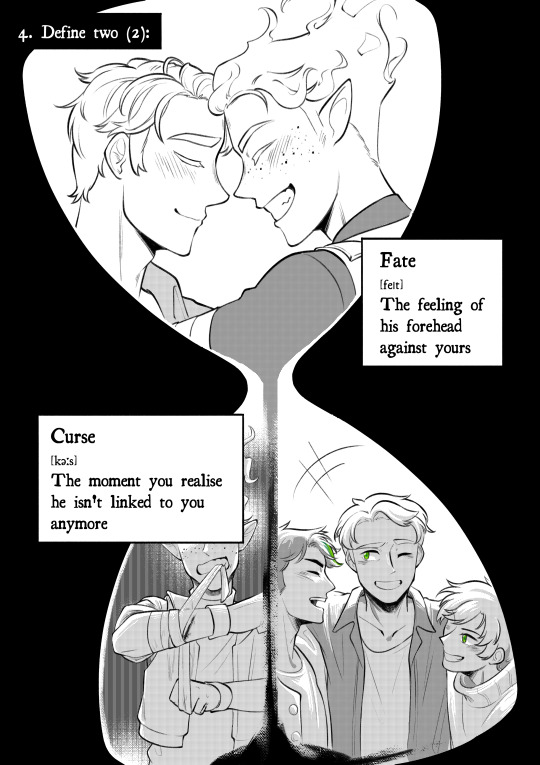
You have 90 minutes to complete. (original poem: r.a.)
In participation of the MCYT Recursive Exchange 2024 hosted by @mcytrecursive!
Inspired by know that all my love will be your breath (i will save you when your lights go out)
[text under cut]
1. Have you ever been in love?
(Please circle your answer.)
a. It's me and him
b. Our hearts beat in sync
c. Our lives intertwined
2. Do you understand what you’ve done?
(Please circle your answer.)
a. I couldn't do anything
b. I lost my balance
c. I doomed us both
3. It's been god knows how long since you felt phantom hands on your neck and there is no one in sight. If you were soul-bound to him and both of you died at the same time then why are you still waiting in the void?
Please answer clearly, in full sentences.
(Not a correct answer:I just wanted to see him one more time).
4. Define two (2):
Fate | The feeling of his forehead against yours
Curse | The moment you realise he isn't linked to you anymore
5. True or False:
i. It was your fault.
ii. You wish you had met him under different circumstances.
iii. You can’t regret a single moment that you had him.
iv. You would do it all over again if you could.
v. It ended long before either of you said anything.
thumbnails:

sketch cover thing for imgur link:

#team ranchers#team rancher#rancher duo#jimmy solidarity#tangotek#trafficshipping#mcyt recursive exchange#events#fic fanart#my art#“canary has butterfly-shaped wings it cant do a dramatic spread like that” watch me. (draws dramatic wings) (sorry)#“you have 90 minutes” have been rattling in my brain for so long ever since i suddenly remembering a web weave using it (yes the beeduo one#very glad i can release it (using it in art) from its confines (my mind)#hm i suppose the title would be more in theme if its abt limited life ranchers#← havnt watched limlife yet#but! happy with what i come up with. lil bit proud even#had so much trouble with the panelling and layers in p2 cause it looks too busy (explodes)#also punching the floor bc i only noticed the “yes-no” pair(?) in the original poem when im already half-done w/ the comic#me when making silly comic makes you do poem analysis#i dont even go there ← does not have enough poetic braincells
2K notes
·
View notes
Text
i refuse to believe that boycotting is hard. my favourite thing in the world is ordering maccies after a late night at work/a concert/getting drunk. yes i do miss it sometimes. but the other night i ordered from a small place near my house instead and it was the most orgasmic burger i've ever had in my life. i very rarely say this but fucking suck it up people are DEAD
#ramble#also only 0.29 delivery instead of 3.99#and chilli cheese bites#i swear to god the best food you'll ever eat while drunk is from the tiny shithole that's open until 4am#if you're refusing to do literally the smallest thing you can do to help then i have questions#it's FOOD. you'll survive#it's not even NECESSARY food#if it was like a chain grocery place and you don't have access to anything else then i would understand#but it's just NOT#make your own coffee for the love of god#when there is NOTHING you can do to stop this fucking tragedy. and let's be honest there isn't a lot normal people can do#and people say to you 'do this insignificant thing just to show that you even CARE'#and you DON'T do that???? what is actually wrong with you#also i've been worried about this since my last post about sbucks but this is Not an attack on the people who WORK at the boycotted places#because it is an absolute privilege to be able to leave your job and immediately find a new one
2K notes
·
View notes
Text
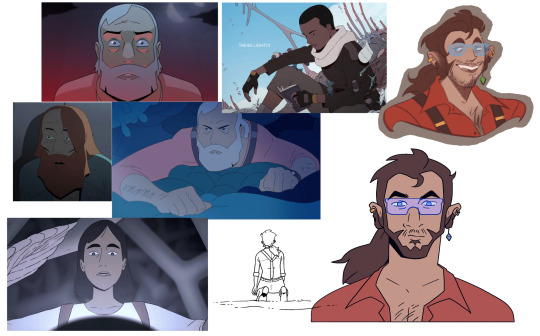
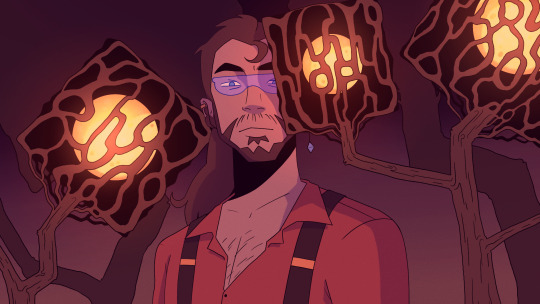

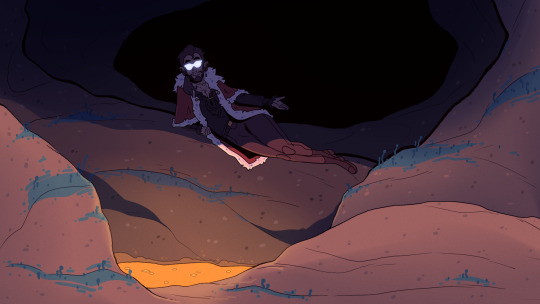
Okay so I need someone who's better at landscapes and art style replication than I am to hop on this idea. because this man and his alien planet biome and storyline were made for the scavengers reign art style fr
#atlas.art#artists on tumblr#mcyt#hermitcraft#hermitcraft 10#rendog#renthedog#scavengers reign#idea that was stuck in my head so bad I finished three full illustrations in a day#these are all screenshot redraws from the show for those who haven't seen it#you should see it by the way. literally one of the coolest pieces of art ever made and I am not exaggerating in the slightest#but yeah. he and his minecraft speculative alien biology were made for this fucking show#I'm actually really happy with how these came out it's been so long since I've tried drawing in a different art style like this
2K notes
·
View notes
Text
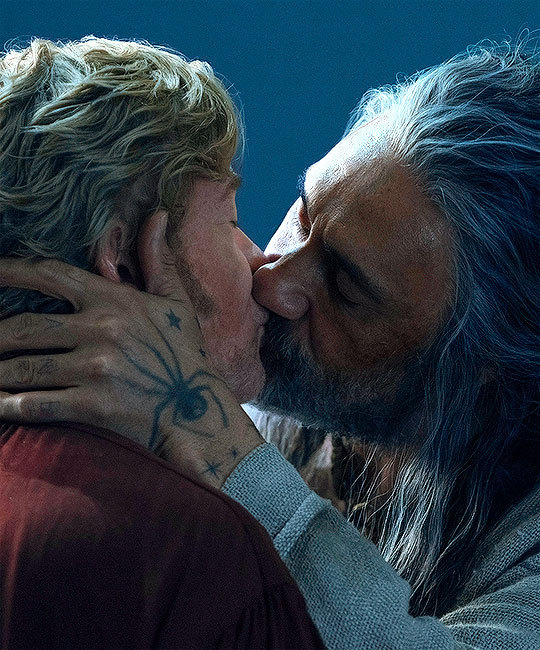
x
#our flag means death#ofmd#ofmdedit#ofmd s2 spoilers#blackbonnet#blackbonnetedit#gentlebeard#gentlebeardedit#edward teach#blackbeard#stede bonnet#taika waititi#rhys darby#literally what do i do with this#WHAT DO I DO WITH ANY OF IT#THERE'S TOO MUCH STUFF MY BRAIN REFUSES TO PROCESS IT#im not even capable of reblogging things yet bc my chest feels like i've been gargling and swallowing glass#i keep having to get up and just walk in circles#i've hyperventilated 73 times since yesterday#i knew david was gonna give us everything we ever wanted but that doesn't mean i was ready to see any of it#anyway i just needed this in the highest resolution on my blog#my stuff
4K notes
·
View notes
Text
15 revealing that apparently the bigeneration was hugely traumatic and not something he could survive again is already insane but especially considering that when he was with 14 neither of them acted like it was anything other than amazing which makes me think 15 was the only one who felt that it was something incredibly damaging but he didn't wanna tell 14 coz he wanted at least one of them to be happy which is sooo.. ough....
#I hope I'm right and at least 14 is ok about it but it should be both of themmmmm#can nothing bad ever happen to 15 ever please. please. please#<- me watching the every main character dies on screen show that I've been watching since i was like 10: sure hope nothing bad happens#doctor who#dw spoilers#15th doctor#14th doctor#dw meta
1K notes
·
View notes
Text
every now and then i think about how asagiri literally said bsd was made for people who aren’t good at living. like he was onto something with that
#the target audience was hit#(me)#(i’m the target audience)#but like actually it became my fav show Instantly and ive been obsessed with it ever since#and i’m not good at living! it was meant to be#i love tbis séries it means so much to me <:#bsd#bungou stray dogs
3K notes
·
View notes
Note
AHHHHHHH I HAVE A QUESTION.. DO YOU THINK MAYBE WE COULD GET MORE PAST MICHAEL?? ISTG I LOVE THE WAY HIS DUMBASS LOOKS IN UR STYLE


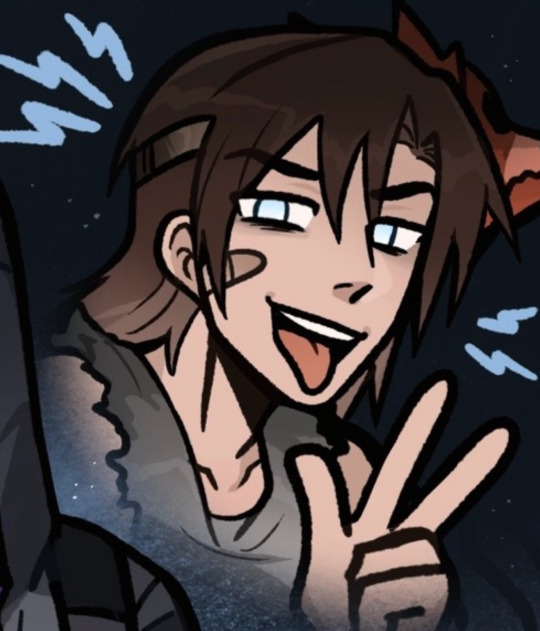
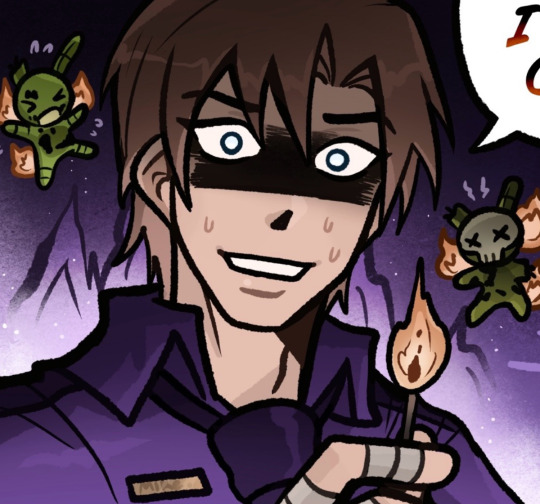
TBH I’ve been meaning to draw more pre scooped and teen Michael! Think it could be fun to do more game specific comics but we’ll see!
#ask reply#I drew pre scooped Michael for like a month and he’s been gone ever since#a crime when the design is this good but also scooped Michael is also good#Michael Afton as a whole is thee best#but yeah definitely will do more with past vers of Michael sometime#I actually want to update the current Michael look to pizza sim era#but we’ll see if I get a design for that anytime soon pff#let’s go Michael Afton enjoyers! 💜
2K notes
·
View notes
Text
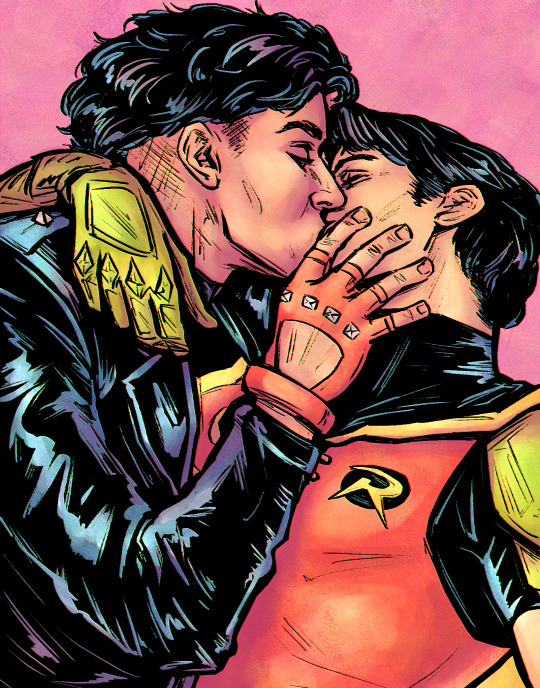
happy valentines day y'all
#conner kent#kon el#superboy#tim drake#robin#red robin#timkon#dc#dc comics#young justice 2019#sam draws shit#been a whole YEAR since the last time i did art of just the two of them together smh. off my game#if ur ever wondering 'does sam still like timkon' of course i do im just both A) picky about what content i like with them/how i like them#portrayed and B) often distracted/into other things too
3K notes
·
View notes
Text
Alpha-17 and Obi-Wan being friends (derogatory) on 17's part and friends (threatening) on Obi-Wan's part is such an underrated dynamic
They could be so funny and terrifying, like Obi-Wan went through a soul shredding experience with Alpha-17 as his only company. They're friends because what else are you gonna be after you witness each other at absolute rock bottom from torture.
It's like 'dog put in cage of cheetah who's threatening to go crazy', except the dog is a grizzly bear and also threatening to go crazy.
Emotional support trooper except the trooper in question has never done any sort of supporting in his life and is actively an emotional distress trooper to a great number of the CC batch.
I want them texting everyday, I want Obi-Wan mailing handmade BFF bracelets to Alpha and Alpha sending pics back of him flipping off the camera but still wearing them, I want Alpha using Obi-Wan to keep track of and occasionally terrorize his cadets, I want 17 ending problems in the GAR (like Krell) before they begin because Obi-Wan has him shipped out on a personal transport at the first opportunity, decked out with slug-throwers Obi-Wan got him for his decant-day.
Natborn officers think this is all just an odd indulgence of General Kenobi, the Vode, however, correctly identify it as a goddamn threat and their danger assessment of Obi-Wan ticks up significantly.
When Alpha arrives on Kamino, Shaak Ti presses a shiny new comm into his hand. It has the Jedi Order symbol painted onto it alongside a smiley face sticker, and it pings immediately with a new message: Hello! I hope you're settling in well!
Alpha stares at the message, stares at the singular contact named 'OWK' and then stares Shaak Ti in the eye as he pitches the comm straight into the ocean. Shaak Ti's serene smile only grows larger as she calmly reaches into her robes and pulls out an identical comm, only this one has a frowny face sticker, and presses it into his hand. It lights up: I'm afraid we've bonded, Alpha :). Alpha shuts it off and pockets it with resignation.
Cody arrives on Alpha-17's personal recommendation.
A-17: He's the most difficult little bastard I have. You're perfect for each other.
OWK: Thank you, he's very handsome :3
A-17: No. Stop.
The first thing he asks once he gets comfortable is who his general is texting so much that has him swinging his legs and twirling his hair. Cody assumes it's Anakin, given they seem joint at the hip anyway, but little does he know Obi-Wan's ability to consistently have the Weirdest Relationships Ever.
"Oh, it's Alpha-17, I understand you're familiar with each other?" Hmm. OK. Cody.exe is experiencing a processing error, please hold. He exits the room instead of answering. The next day he peeks over the General's shoulder when he's texting and sees walls of rambling messages from Obi-Wan. Alpha-17 replies every hour with a single text: Lose this number. Obi-Wan giggles. "He's so funny." he says.
When Obi-Wan meets the rest of the CC batch, Cody makes sure to stand perfectly angled so that he can record the reactions when his general cuts off their introductions with "Oh, no need, Alpha-17's told me all about you." It's always immediate FEAR.JPG followed by a slow spiral of What The Fuck.
What do you mean by that General. What does that mean Cody. What do you mean they text. No. Cody. What the fuck is happening, Cody. Alpha-17 doesn't have friends he has enemies and enemies he tolerates enough not to shoot on sight.
OWK: Wolffe reached for his vambrace? when I mentioned you
A-17: That's where he keeps his spare knife.
OWK: Hm that does explain the way he eyed me up, ambitious.
A-17: Clearly not enough, he should have followed through. I taught them better.
#alpha obi wan and cody are so powerful together they could win the war or start an entirely new one. who knows :)#i fully think 17 awakens the feral cat part of obi wan thats been dormant since qui gon died and he had to become a responsible brotherdad#like at last someone to scruff him by the neck and call him stupid its very familiar to obi wan it brings back memories#fully on my 'obi wan has the weirdest relationship dynamics ever' agenda#obi wan is a lying liar who loves lying and the biggest lie is that he's the only normal well-adjusted one here. no. he is SO deeply strang#obi wan kenobi#star wars#alpha 17#commander cody
2K notes
·
View notes
Text
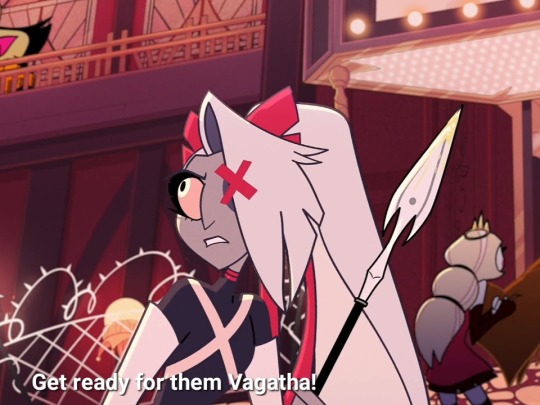


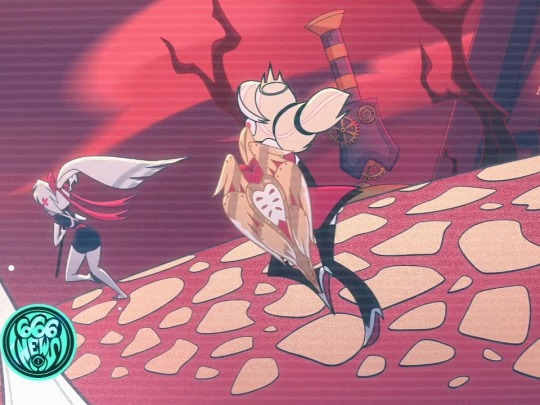
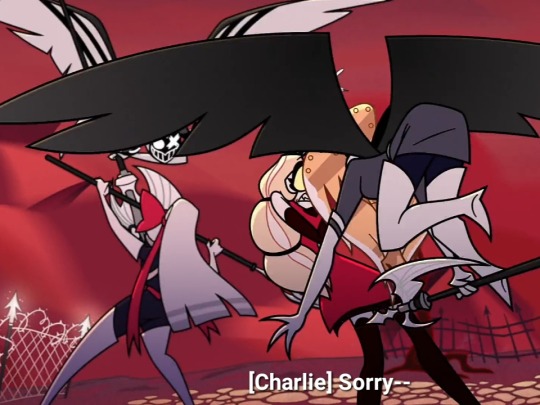
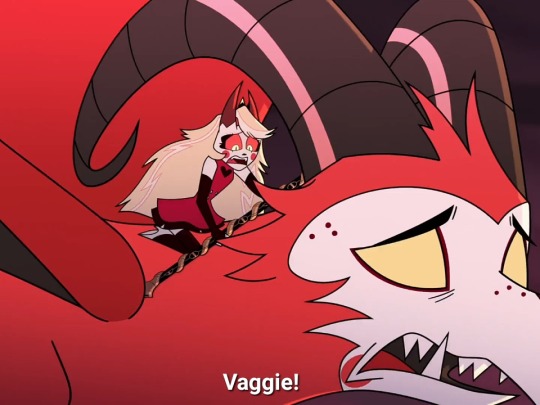
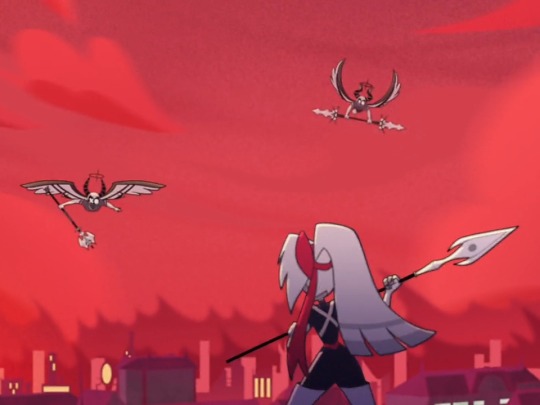
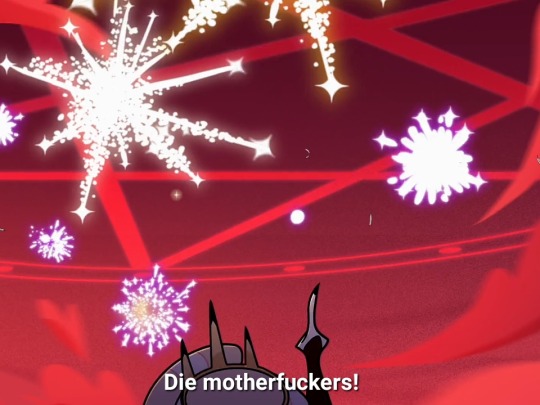


Love that Charlie was so protective of Vaggie during the whole battle against the angels. She was literally following her around the whole time. She was so hyper aware of her, being Vaggie's shield, especially since Carmilla pointed out that angels like Vaggie have a bad habit of forgetting to defend themselves. One of the criticisms against Chaggie is that Vaggie dedicates too much of herself to Charlie, but the thing is she's only like that in the first place because Charlie loves her just as much. Vaggie needs to work on looking out for herself ofc(they're already dating in the show. They need something to develop from duh) but it really makes so much sense for Vaggie to be as devoted as she is when it's a woman like Charlie she's in love with.
#hazbin hotel#chaggie#charlie morningstar#vaggie#like#charlie didn't just save vaggie that one time#she's been showering her with love ever since#ofc Vaggie's gonna wanna give that back
2K notes
·
View notes